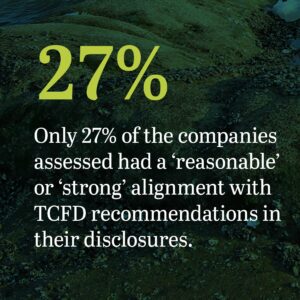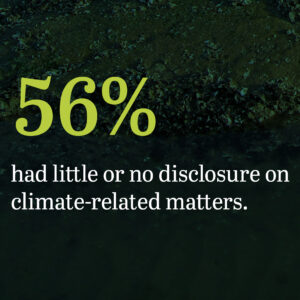As of April 6, UK listed companies, large asset owners, LLPs and large private companies are required by law to report on how climate change impacts their business, and vice versa, in line with Task Force on Climate-related Financial Disclosures (TCFD) recommendations. Our research shows that the majority are not ready, say sustainability experts Eleanor King and Laura Brankin.
The global movement towards mandatory climate-related financial disclosures is picking up pace, especially in the UK, although research conducted last year by AECOM on behalf of the Department for Business, Energy & Industrial Strategy (BEIS) suggests that the majority of businesses required to comply are not fully prepared.
The new regulations and what they mean for UK businesses
In June last year, the G7 nations made a commitment that climate related information should align to Task Force on Climate-related Financial Disclosures (TCFD) recommendations.
TCFD recommendations are widely viewed as the gold standard for disclosure across the globe. They are designed to allow organisations to report consistent information to stakeholders and investors that is useful for decision-making. This information can include an organisation’s exposure to transition and physical climate risks as well as their strategy to both mitigate these risks and harness opportunities to decarbonise. The TCFD recommendations encourage organisations to fully embed climate risk into the way they do business, placing as much importance on effective governance, leadership commitment and financial risk management as other aspects such as collecting data and setting targets on greenhouse gas (GHG) emissions.
In the UK, disclosing on TCFD is already a legal requirement for many organisations, including banks, building societies and Financial Conduct Authority (FCA) premium listed companies. On April 6 however, the Department for Business, Energy & Industrial Strategy (BEIS) extended this to all UK listed companies, large asset owners, Limited Liability Partnerships (LLPs), and large private companies (defined as those with more than 500 employees and a turnover of more than £500m).
To be fully aligned, companies must include climate-related information in mainstream annual financial filings, (the location is slightly different for LLPs) for accounting periods starting on or after April 6. Eventually, the government will extend the TCFD-aligned reporting requirement to all UK companies by 2025.
How ready are UK businesses?

In March 2021, we conducted an assessment of climate-related reporting by large private UK registered companies on behalf of BEIS. The research revealed that only 27 per cent of the 150 companies assessed had a ‘reasonable’ or ‘strong’ alignment with TCFD recommendations in their disclosures. In contrast, 56 per cent had little or no disclosure on climate-related matters.
This level of reporting is mirrored elsewhere. According to the Financial Stability Board’s annual status report, an average of just one in three global companies reviewed disclosed climate-related information aligned with TCFD recommendations (although the report does note an acceleration between 2019-20 of nine per cent, “consistent with global momentum”).

Moreover, ‘TCFD’ as a keyword search was only found in the disclosures of eight companies in our research indicating that disclosure explicitly linked to TCFD is uncommon amongst UK Limited companies (or parent companies reporting on their behalf).
We also found that larger companies (by turnover) are disclosing information that is better aligned with TCFD recommendations than smaller companies. Our research also suggests that those companies with a dedicated Sustainability or ESG team have a higher quality of disclosure.
In general, stronger disclosure was identified in the TCFD pillars of ‘Governance’ and ‘Metrics and Targets’ rather than for the TCFD pillars of ‘Strategy’ and ‘Risk Assessment’, suggesting that the forward-looking, future perspective of TCFD as well as embedding climate risk into business strategy and financial risk appraisals may be less mature.
Drivers and barriers
Following our assessment of the quantity and quality of disclosures amongst the 150 companies included in the survey, we then interviewed 38 companies from a range of sectors for further clarity and granularity on the drivers behind the disclosures, the recognised benefits, and barriers experienced.
Several common barriers to corporate climate reporting were raised regardless of size, sector or maturity of reporting: lack of time and resources; costs associated with disclosure; data collection issues; and insufficient internal expertise or knowledge. The government’s recently published non-binding guidance is welcome, however the extent of unreadiness highlighted in our research suggests that many companies will struggle to overcome these barriers without significant organisational change, external support, and learning from others.
Furthermore, ‘requests from stakeholders and investors’ and ‘a regulatory requirement’ were identified as two of the four most common drivers for companies to be reporting. The latter will only increase in importance as governments across the world start to mandate. However, companies who view the mandatory requirements as simply an annual report-writing exercise will be missing the point. Companies should view these new requirements as an opportunity to understand the benefits of incorporating climate into financial risk management and business plans, and to show stakeholders and investors that these risks are taken seriously.
About the authors
With thanks to AECOM Editors for allowing us to share and celebrate the articles & blogs from various leaders and employees
